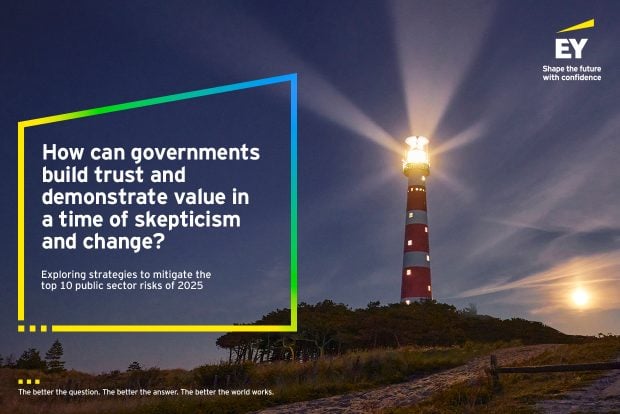Getting to net zero: how governments and infrastructure players can close the gap


The growing impact of climate change has been laid bare this summer. July saw the three hottest days on record, while wildfires spread across both Europe and North America.
United Nations secretary general António Guterres has said this “cruel summer” demonstrated that “the era of global boiling has arrived”, so governments need to act to reduce emissions and prepare for the impacts of climate change.
150 countries around the world have committed to getting to net zero, and current government decarbonisation policies are mobilising US$75 trillion to abate climate change impact by 2050.
However, research by EY and the International Federation of Consulting Engineers (FIDIC) has found that this investment is not sufficient to fully decarbonize economies, with a total investment of US$139 trillion in sustainable infrastructure required – a gap of US$64 trillion.
This webinar with knowledge partner EY, will brought together public servants from around the world to discuss how governments can close this investment gap.
We discussed how governments can assess the investment they need to make in net zero, and look at how different countries around the world are catalysing investment in sustainable infrastructure through collaboration with the broader infrastructure community of asset owners, investors, innovators and businesses.
This session discussed:
- The key investments that governments will need to make to get to net zero.
- How governments can fund or facilitate these crucial investments.
- The benefits and challenges of raising investment from different sources.
- How to prioritise and accelerate the most impactful infrastructure projects to deliver net zero.
Panel
Jodie Parmar, Head of Project Development for Western Canada, Canada Infrastructure Bank

Jodie Parmar is the Head of Project Development for Western Canada – leading the CIB’s engagement with both public and private project sponsors in the West across all investment sectors. Jodie is also the National Lead for Agricultural Infrastructure whereby he leads CIB’s investment activities in agriculture and agrifood. In his role, Jodie offers advice and makes investments consistent with the CIB’s focus on new infrastructure in key priority initiatives.
Jodie has almost 30 years of experience in lending to, structuring and advising on project finance and public-private partnership transactions across a variety of infrastructure asset classes. He holds an MBA from the University of Toronto’s Rotman School of Management and a BA in Economics from the University of Regina. He also holds a Certificate (Honours) in Business Intelligence – Data Analysis & Reporting from SAIT Polytechnic in Calgary. Jodie is a CPA, CMA, and has also completed executive development programs at institutions such as the Harvard Business School and Queen’s University.
Jennifer Jenkins, Associate Director of Project Advisory and Evaluation, Infrastructure Australia

Jennifer Jenkins is an Associate Director of Project Advisory and Evaluation at Infrastructure Australia, the independent infrastructure advisor to the Australian Government. Jennifer leads the evaluation of transport, water, energy, and communications infrastructure proposals seeking more than $250 million in Australian Government funding. She also leads Infrastructure Australia’s work to support Australian Government objectives to decarbonise infrastructure and better consider sustainability and resilience in infrastructure planning and appraisal.
Jennifer is an economist, with over 10 years’ experience in policy development and environmental economics within government. Her work in government included developing guidance on valuing green infrastructure and the use of non-market valuation methods to improve government investment decision making.
Jonathan Morris, Director, Infrastructure, EY

Jonathan is a Director in EY and part of its global infrastructure leadership team. He has over 20 years experience in the development and delivery of ground breaking complex £multi-billion infrastructure megaprojects across the Road, Rail, Aviation, Energy, and Government sectors.
…………………………………………………………………………………………………………………………………………….
Graham Pontin, Director of Policy, External Affairs and Communications, FIDIC

As FIDIC’s director of policy, external affairs and communications, Graham oversees a number of key areas of FIDIC’s work, including, policy, advocacy and lobbying, economic research and thought leadership and communications and media relations. He is an economist with more than ten years’ experience and has skills in market research and policy development and implementation.
…………………………………………………………………………………………………………………………………………………………………….
Webinar chair: Siobhan Benita, Facilitator, Global Government Forum

Siobhan Benita was a senior civil servant with over 15 years’ Whitehall experience. She worked in many of the major delivery departments, including Transport, Environment, Health and Local Government. She also had senior roles at the heart of Government in the Cabinet Office and HM Treasury, including supporting the then Cabinet Secretary, Lord O’Donnell to lead work on Civil Service reform and strategy. Siobhan left the Civil Service to run as an independent candidate in the Mayor of London election. She subsequently joined her alma mater, Warwick University as Chief Strategy Officer of Warwick in London and Co-Director of the Warwick Policy Lab.













